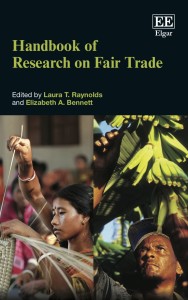 “This handbook is a long-needed, comprehensive examination of fair trade’s multifaceted and shifting coordinates by leading scholars from a wide range of disciplines. An invaluable resource for researchers and students alike.”
“This handbook is a long-needed, comprehensive examination of fair trade’s multifaceted and shifting coordinates by leading scholars from a wide range of disciplines. An invaluable resource for researchers and students alike.”
– Daniel Jaffee, Professor of Sociology, Portland State University (USA), Author of Brewing Justice: Fair Trade Coffee, Sustainability, and Survival (2007, 2014)
Download the introduction for FREE
Table of contents + chapter abstracts
Paperback (USD $45.45)
E-book (USD $60)
ISBN: 978178347460
About the volume: Fair trade critiques the historical inequalities inherent in international trade and seeks to promote social justice by creating alternative networks linking marginalized producers in the global South with progressive consumers in the North. The first of its kind, this volume brings together 43 of the world’s foremost fair trade scholars from across the social sciences to synthesize existing research, evaluate key debates and identify critical questions. The Handbook serves as both a comprehensive overview and in-depth guide to dominant perspectives and concerns. Chapters analyze the rapidly growing fair trade movement and market, exploring diverse initiatives and organizations, production and consumption regions, and food and cultural products. Written for those new to fair trade as well as those well versed in this domain, the Handbook is an invaluable resource for scholars and practitioners interested in global regulation, multi-stakeholder initiatives, ethical labeling, social and environmental certification, consumer activism, and international development.
Part I, ‘Introduction’, provides an overview of fair trade, analyzing fair trade as a movement and market and focusing on the complex and contested nature of dominant institutions, market relations, commodity networks and production conditions. Part II, ‘The fair trade movement’, examines the varied forces which have historically shaped fair trade activism and organizations. It highlights the complexities, controversies and contradictions that have generated both innovation and fragmentation within the movement. Part III, ‘The Business of Fair Trade’, examines how the vision of fair trade has been put into practice, paying close attention to the dynamics of ethical labeling, the strategies of firms, the role of market forces and shifting consumption patterns. Part IV, ‘Fair Trade and International Development’, examines the implications of fair trade for diverse producers and their communities. Typically focusing on a single region, commodity or development objective, each chapter offers a unique perspective on the efficacy of fair trade as a vehicle for development in the global South.
Praise for the Volume
“Raynolds and Bennett have done a major service with this excellent handbook, providing a sweeping overview of the past quarter century of fair trade work and research. The book offers wide-ranging insights from top experts concerned with theory and practice, and careful attention to fair trade’s gains and losses. It will be of great interest to practitioners, activists, and scholars, and bound to be a cornerstone for the next phase of fair trade work and research.”
– Gavin Fridell, Professor of International Development Studies, Saint Mary’s University, Canada, Author of Fair Trade Coffee: The Prospects and Pitfalls of Market-Driven Social Justice (2007) and Alternative Trade: Legacies for the Future (2013)
“This is an important contribution to building the research field of Fair Trade globally. The contributions significantly move a range of important debates forward and offer a state-of-the-art account of this most significant sector within ethical consumption.”
– Alex Nicholls, Professor of Social Entrepreneurship, Said Business School, University of Oxford, Co-author of Fair Trade: Market-Driven Ethical Consumption (2005)
“Fairtrade is at a cross roads. It faces the challenges of managing successful rapid expansion in scale and scope, and tensions within the movement over whether its founding principles are compromised by mainstream commercial engagement. This Handbook brings together an excellent set of critical contributions at the cutting edge of research on fair trade. They provide a wide range of perspectives and insights into different conceptual approaches and empirical case studies covering a variety of products, issues and regions. The Handbook is vital reading for all academics, students and practitioners with an interest in fair trade and its future advance in a rapidly changing world.”
– Stephanie Barrientos, Professor and Associate Director, Brooks World Poverty Institute,University of Manchester, UK, Co-Editor of Ethical Sourcing in the Global Food System (2006)